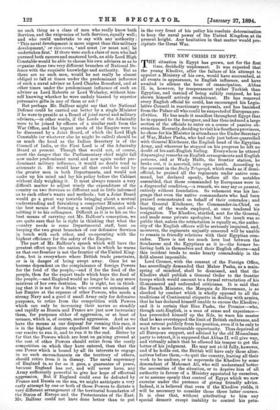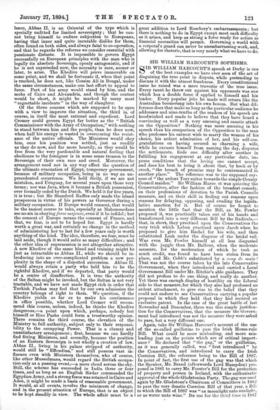nth NEW CRISIS IN EGYPT. T HE situation in Egypt has
grown, not for the first time, decidedly unpleasant. It was expected that the young Khedive, after the failure of his attempt to appoint a Ministry of his own, would have succumbed, at all events in appearance, to English influence, and have awaited in silence the hour of emancipation. Abbas U. is, however, by temperament rather Turkish than Egyptian, and instead of being sulkily resigned, he has shown himself actively recalcitrant. He has removed every English official he could, has encouraged his Legis- lative Council in reactionary proposals, and has banished from the Palace all who could be suspected of European pro- clivities. He has made it manifest throughout Egypt that he is opposed to the foreigner, and has thus induced a large section of the officials to enter on a course of passive ob- struction. Recently, deciding to visit his Southern provinces, he chose for his Minister in attendance the -Under-Secretary of War, Maher Pasha, who had only just before quarrelled with General Kitchener, the English head of the Egyptian Army, and wherever he stopped on his progress he left no doubt of his anti-English feeling. Everywhere he uttered disparaging remarks on English arrangements and English persons, and at Wady Haifa, the frontier station, he broke out, it is asserted, into open insult. According to the account in the Daily Telegraph, which reads as if demi- official, he praised all the regiments under native com- mand, but declared openly, before all the notables assembled, that those commanded by Europeans were in a disgraceful condition,—a remark, we may say en passant, entirely without foundation. So vehement was his lan- guage that even the native commandants who had been praised remonstrated on behalf of their comrades ; and that General Kitchener, the Commander-in-Chief, on hearing of the words employed, at once tendered his resignation. The Khedive, startled, sent for the General, and made some private apologies ; but the insult was so public that, unless the retractation is equally so, the autho- rity of the English officers will be seriously impaired, and, moreover, the regiments unjustly censured will be unable to remain in friendly relations with their Egyptian com- rades. There is not too much love lost between the Soudanese and the Egyptians as it is—the former be- lieving both in themselves and their English officers—and this incident tends to make hearty comradeship in the field almost impossible.
Lord Cromer, with the consent of the Foreign Office, has accordingly demanded that Maher Pasha, as a main- spring of mischief, shall be dismissed, and that the Khedive shall publish a General Order to the frontier troops which would amount to a formal retractation of his ill-mannered and unfounded criticisms. It is said that the French Minister, the Marquis de Reverseaux, is so shocked by conduct which is wholly opposed to all the traditions of Continental etiquette in dealing with armies, that he has declared himself unable to excuse the Khedive ; and it is certain that Riaz Pasha, the Premier—who, though anti-English, is a man of sense and experience— has proceeded himself up the Nile, to warn his master that he has overstepped the limit of British endurance, and must retreat publicly from his position, even if it be only to wait for a more favourable opportunity. Thus deprived of all European support, and advised by the old Mussuiman party to retract, it is supposed that Abbas II. will give way, and virtually admit that he allowed his temper to get the better of his judgment. He may not yield fully, however, and if he holds out, the British will have only these alter- natives before them,—to quit the country, leaving all their work to be undone, or to supersede the Khedive by some descendant of Mahomet Ali, who will understand better the necessities of the situation, or to deprive him of all authority in favour of a Ministry appointed by ourselves, or to assume openly that control of Egypt which we now exercise under the pretence of giving friendly advice. Indeed, it is believed that even if the Khedive yields, it will be necessary to consider those three latter courses. It is clear that, without attributing to him any special demerit except inability to control his petu- lance, Abbas II. is an Oriental of the type which is specially unfitted for limited sovereignty ; that he can- not bring himself to endure subjection to Europeans, having that inner and quite incurable dislike for them, often found on both sides, and always fatal to co-operation, and that he regards the reforms we consider essential with passionate distaste. It is impossible to govern Egypt successfully on European principles with the man who is legally its absolute Sovereign, openly antagonistic, and if he is not superseded now, the necessity is sure, sooner or later, to arise. The Khedive will prove immovable on some point, and we shall be fortunate if, when that point is reached, he does not, like Cossim Ali in Bengal, under the same circumstances, make one last effort to appeal to force. Part of his army would stand by him, and the mobs of Cairo and Alexandria, and though the contest would be short, it might be marked by many most "regrettable incidents" in the way of slaughter. Of the three courses which are supposed to be open with a view to improve the situation, the third is, of course, in itself the most rational and expedient. Lord Cromer could govern Egypt far better as the " British Commissioner with the Army of Occupation," with nothing to stand between him and the people, than he does now, when half his energy is wasted in overcoming the resist- ance of the native officials. The Ministers would obey him, once his position was settled, just as readily as they do now, and far more heartily, as they would be free from the very pardonable and natural feeling that obedience to the foreigner is in some sense treason to the Sovereign of their own race and creed. Moreover, the arrangement need not in any way affect the question of the ultimate evacuation of Egypt, temporary government, because of military occupation, being in no way an un- precedented occurrence. We held Sicily, if we are not mistaken, and Uruguay, for several years upon those very terms ; nor was Java, when it became a British possession, ever formally ceded by the Dutch. We held it for five years, it is true ; but Sir Stamford Raffles only made the island prosperous in virtue of his powers as Governor during a military occupation. If Europe would consent, that would be the easiest course to take, especially as Mahommedans see no sin in obeying force majeure, even if it be infidel; but the consent of Europe means the consent of France, and that, we fear, is not to be hoped for. Egypt is hardly worth a great war, and certainly no change in the method of administering her to last for a few years only is worth anything of the kind. The idea, therefore, we fear, must be laid aside, though it would solve so many difficulties ; and the other idea of supersession is not altogether attractive. A new Khedive of the same blood and training might be just as intractable as Abbas II., while we should be in- troducing into an over-complicated problem a new per- plexity in the shape of a disputed succession. Abbas II. would always retain a party who held him to be the rightful Khedive, and if we departed, that party would be a centre of disaffection. It is true the authority of the Sultan might be invoked, but the Sultan is not very tractable, and we have not made Egypt rich in order that Turkish Pashas may feel that by our own admission the country belongs of right to them. We question, if the Khedive yields so far as to make his continuance in office possible, whether Lord Cromer will recom- mend this course, unless, indeed, he thinks the Khedive dangerous,—a point upon which, perhaps, nobody but himself or Riaz Pasha could form a trustworthy opinion. There remains the third course, the elevation of the Ministry to full authority, subject only to their responsi- bility. to the occupying Power. That is a clumsy and unsatisfactory arrangement ; first, because we can hardly find fitting Ministers, and secondly, because the position of an Eastern Sovereign is not wholly a creation of law. Abbas I][., living in his palace stripped of authority, would still be " Effendina," and still possess vast in- fluence even with Ministers themselves, who of course, like other Mussulmans, would regard the British occupa- tion only as a passing event,—a mere cloud across the sky. Still, the scheme has succeeded in India three or four times, and as long as an English Sirdar commanded the Egyptian Army, and a strong force was retained in Cairo and Aden, it might be made a basis of reasonable government. It would, at all events, involve the minimum of change, and in the present situation of Europe, that is an object to be kept steadily in view. The whole affair must be a great addition to Lord Rosebery's embarrassments ; but there is nothing to do in Egypt except meet each difficulty as it arises, and keep as strong a force ready for action as financial necessities will permit. Governing a world with a corporal's guard can never be unembarrassing work, and, allowing for rhetoric, that is very nearly what we have to do.



















































 Previous page
Previous page